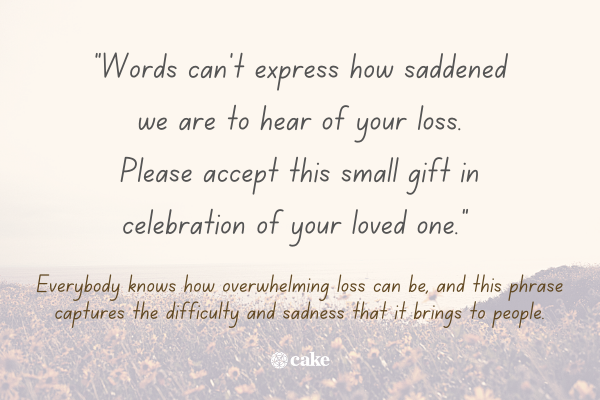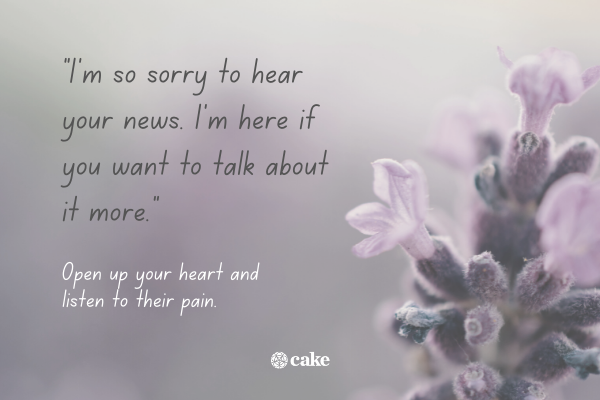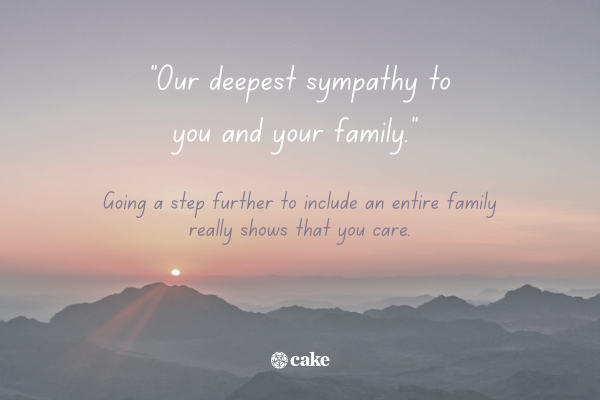Funny Ways to Say Im in Pain
Your first reaction may be to say, "I'm sorry to hear that," to people when they've received terrible news or are grieving a loss.
There's certainly nothing wrong with this, but it may seem flat and unemotional in some situations, especially when someone loses a loved one. You don't want to sound like you don't care or understand, so it may be more appropriate to say something a little deeper and more meaningful.
There are numerous ways you can extend condolences that may sound and feel a bit more empathetic. Here are a few other phrases you may want to use to extend warmth and understanding during a difficult time.
Tip: If someone you know recently lost a loved one, our post-loss checklist can help them sort through the complicated tasks and challenges they might be facing.
1. "Words can't express how saddened we are to hear of your loss. Please accept this small gift in celebration of your loved one."

When words aren't enough, it's okay to say that. Everybody knows how overwhelming loss can be, and this phrase captures the difficulty and sadness that it brings to people. This phrase can be added to a card or letter to extend more warmth.
Consider sending your loved something comforting, like a gourmet charcuterie and cheese gift basket or a tin of fresh-baked cookies.
2. "I can't imagine how much you're hurting right now."
This phrase offers a more personal touch when you extend your sadness about hearing upsetting news.
It uses stronger terminology than a simple "I'm sorry," which goes one step further toward expressing deep sadness or regret.
3. "I'm so sorry for your loss. This must be incredibly difficult for you."
It may be a good idea to validate someone's loss by acknowledging his or her challenges. You may still extend an apology, but add an extra sentence that extends empathy or compassion.
4. "I'm sorry to hear such terrible news."
Another way to say that you are sorry to hear something is also to express that the news is, in fact, terrible. Sometimes that acknowledgment really means a lot to someone.
There may be no other way to express yourself than to simply acknowledge that this is an awful situation for anybody to be in.
5. "I'll be right over with dinner and games for the kids."
Saying you are sorry may not feel like enough. You may also ask what you can do to help ease the burden during this challenging time. You could watch young children, help around the house, or simply cook dinner for a grieving family.
Make sure that you have the time and availability to see this through. You never know what may be asked of you, and this is certainly not a time to flake.
6. "My heart hurts for you."
Letting someone know that what he or she is going through matters deeply to you can certainly help a friend or loved one understand that they are not alone in grief. This communicates that you not only appreciate the difficulty of the situation, you also care deeply.
7. "I hope that you find moments of peace during this hard time."
You may also wish for moments of peace during a harrowing time.
It's not easy for people to find solace when they lose someone that they love, so your hope for this will certainly mean a lot to anyone who hears these words.
8. "I'm terribly sorry. Words simply aren't enough."
This simple statement can go a long way to offer comfort. It's direct but also indicates that you sincerely mean what you're saying.
Remember, you aren't trying to repair or fix anything when you extend your sympathy to someone. In many instances, there's simply nothing you can do except acknowledge and validate.
Download your free end-of-life plan.
Enter your email below to get your free checklist in your inbox.
Thanks! Your checklist is on its way.

9. "I'm so sorry to hear your news. I'm here if you want to talk about it more."

It's difficult for people to share loss or suffering, so acknowledging their news and feeling that pain right along with them can certainly mean a lot.
Open up your heart and listen to their pain.
10. "I can't imagine how you must feel."
The truth is, grief is a personal experience. Admitting that you have no idea what your friend or loved one is going through can actually let people know that you understand the gravity of their situation.
11. "I hope you can take comfort from your cherished memories."
Finding comfort can be difficult during times of loss. However, if you know the grief-stricken person well, then you are likely aware of something they may find comfort in, such as family, friends, or even memories.
12. "Please accept my deepest sympathies."
Whether you are writing a condolence email or delivering a speech, this phrase can certainly be used.
Extending your deepest sympathies is often a better way to connect with people on a more personal level about their loss.
13. "I know life is hard right now, but I'm here for you."
It can be hard to find the right words to say. If you can't, it's okay to admit that and simply offer your presence instead.
This can touch people's hearts in a monumental way. Sometimes people just need a shoulder to cry or someone to listen to them. Being a soft place to land for someone else is the ultimate act of care.
14. "I've thought of some ways I can help. I am happy to help around the house, or simply sit with you and talk."
Your help may be just as appreciated as your words. Offer your assistance and also think of ways that you can help without having to be asked. Perhaps you can make dinner or just be a listening ear.
15. "I hate to hear that (name) passed away. They will be greatly missed by everyone who knew them."
This simple phrase can be attached to various levels of bad news. Consider whether it's appropriate for the situation, as this phrase may need to be coupled with additional sentiments in a card or letter.
16. "I'm only one phone call away."
This phrase is another way to say that you are there and available if the grieving person needs your support in any way.
Make sure that the individual actually has your current phone number. You never know when someone may take you up on this offer.
17. "I know how much your (mother, daughter, sister, brother, etc.) meant to you."
Stating that you recognize the bond between the living and the person who has passed will go a step toward helping people realize that their loved one is not forgotten.
18. "Please accept my heartfelt sympathy with the loss of your loved one."
This is a more formal statement but is still thoughtful. This may be appropriate for a card or email, but can certainly be spoken as well.
You may want to include this with a vase of fresh-cut sympathy flowers and a card to go one step further as you express your grief.
19. "May your many memories help sustain you during this challenging time."
Rather than stating a simple apology, you may want to offer some words of encouragement instead.
Sometimes, reminding the person of what he or she has left—all the wonderful memories—can provide a small sense of comfort during his or her time of grief. It can touch the hearts of those who need to hear it the most.
20. "Our deepest sympathy to you and your family."

Going a step further to include an entire family really shows that you care. This statement can be appropriate when you know the recipient has extended family who is just as devastated.
21. "I'm thinking of you during this difficult time. You mean so much to me, and I want you to know that you're in my prayers."
Sometimes, an apology for a difficult time can simply fall flat. Instead of expressing an apology, sometimes it's best to validate the difficulty of the situation and simply state that your friend or loved one is in your thoughts.
This phrase is small enough that it may be attached to a flower, card, or added to a letter.
Words from the Heart
It's not always easy to know the right thing to say as someone copes with the loss of a loved one. But speaking from your heart is a sure way to let someone else know that you're there and that you care. You never know just how much your words may mean to someone, so it's certainly important to take some time to think before you speak.
Remember, you know this person. Think of what he or she may need to hear from you during a very difficult time. Consider whether your message is best said in a phone call, in person, or in a letter or card. Above all else, make sure that you are sincere — it makes all the difference.
If you need more guidance on how to express sympathy during such a difficult time, read our suggestions for the best sympathy gift ideas that you can send a loved one.
If you're looking for more ways to apologize, read our guide on the best ways to say sorry.
Source: https://www.joincake.com/blog/sorry-to-hear-that/
0 Response to "Funny Ways to Say Im in Pain"
Post a Comment